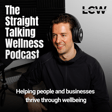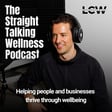
Epiosde 6 - Time to Talk Day
In honour of Time to Talk Day, we’re bringing you a powerful conversation on mental health with LCW founder Russ Harris alongside LCW consultant psychologist Dr. Garret O’Moore.
This episode dives into the realities of mental health at work, why we struggle to talk about it, and how we can move beyond stigma to real, practical solutions. Russ and Dr. O’Moore share insights on resilience, emotional flexibility, and the tools that actually make a difference in handling stress, anxiety, and workplace pressures.
Whether you're an employee, leader, or business owner, this conversation will help you rethink how we approach mental wellbeing—both for ourselves and those around us. Let’s start talking.
For more content head to the LCW app via this link
Follow our socials at LCW instagram

